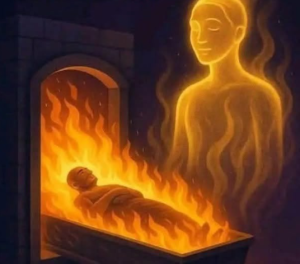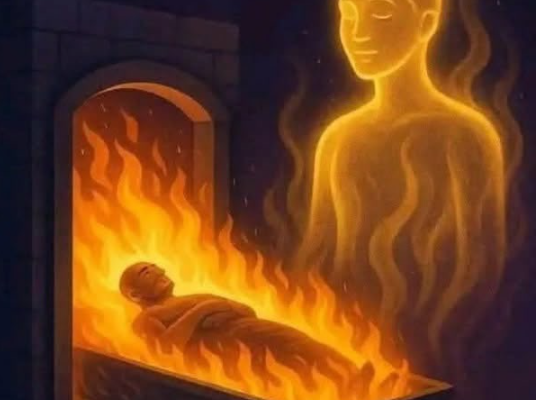
The Sin of Cremation According to the Bible: A Closer Look
Cremation has become increasingly common around the world. Many families choose it for financial reasons, convenience, or cultural preference. In some societies, cremation is considered an honorable way to release the body back to nature. Yet among Christians, there has long been debate over whether cremation is a sin according to the Bible. Some believe the practice dishonors God’s design for the body, while others argue that Scripture does not directly forbid it. To truly understand the discussion, we need to explore what the Bible says—or doesn’t say—about cremation, burial, and the treatment of human remains.
Historical Background: Burial in the Bible
In ancient Israel, burial was the most common and respected practice for handling the dead. The Old Testament gives numerous examples of burial: Abraham purchased the cave of Machpelah to bury Sarah (Genesis 23). Jacob was buried there as well (Genesis 50:13). Even Joseph, who died in Egypt, requested that his bones be carried back to the Promised Land for burial (Exodus 13:19).
Burial symbolized hope in the promises of God. Laying the body in the earth mirrored the belief in resurrection and the dignity of human life. Because the Israelites held such a high view of the body as created in the image of God, burning it was often associated with judgment, disgrace, or pagan practices. For example, in Amos 2:1, God condemned the Moabites for burning the bones of the king of Edom to ashes, treating it as a sin against His holiness.
Biblical References to Burning of Bodies
Although the Bible does not issue a clear commandment against cremation, several passages reveal negative associations with burning human remains:
-
Judgment and Punishment – Burning was often connected to God’s wrath. For example, Achan’s sin in Joshua 7 led to his execution and burning as punishment. Similarly, those who engaged in pagan idol worship were sometimes burned as a sign of disgrace.
-
Desecration of Bones – In Amos 6:10 and Amos 2:1, burning bones is treated as an act of dishonor. Cremation was not considered a noble practice but an insult to human dignity.
-
Contrast with Honorable Burial – Kings, prophets, and faithful servants of God were buried, not cremated. Burial was seen as the natural, God-honoring way to return the body to the ground: “For dust you are, and to dust you shall return” (Genesis 3:19).
The Christian View of the Body
Why did burial matter so much? In Scripture, the human body is not a disposable shell but a temple of the Holy Spirit (1 Corinthians 6:19–20). Even in death, the body carries dignity. Burial reflects the idea that the body “sleeps” until the resurrection. Paul describes the body as being “sown in corruption” but “raised in incorruption” (1 Corinthians 15:42–44).
This imagery makes burial seem like planting a seed in the ground, awaiting God’s power to raise it to new life. Cremation, in contrast, reduces the body to ashes quickly and unnaturally. For those who emphasize the symbolism of resurrection, cremation appears to interrupt or deny this process.
Is Cremation a Sin?
The central question is whether cremation itself is sinful. Strictly speaking, the Bible never states, “You shall not cremate.” It does, however, give strong cultural and spiritual reasons why burial was the practice of God’s people.
Those who argue that cremation is a sin point to:
-
Its association with pagan rituals.
-
Its connection to God’s judgment rather than blessing.
-
Its denial of the body’s dignity and symbolic role in resurrection.
Others counter that God is all-powerful and does not need a preserved body to resurrect someone. After all, martyrs burned at the stake, soldiers lost at sea, and victims of disaster will all be raised by God. What matters most, they argue, is the faith of the deceased, not the method of body disposal.
Cultural Shifts and Practical Considerations
In the modern world, burial is often expensive, while cremation is more affordable. Families sometimes choose cremation due to land shortages, environmental concerns, or family preferences. In places where cremation is the norm (such as parts of Asia), Christians often wrestle with balancing cultural practices and biblical convictions.
Some pastors counsel that while cremation may not be the biblical ideal, it is not an unforgivable sin. The key issue is the attitude of the heart: Are we honoring God and trusting in His promises, or are we carelessly treating the body as meaningless?
What About Resurrection?
One concern Christians often raise is whether cremation interferes with resurrection. The short answer is no. God, who created humanity from the dust, is fully able to raise a body from ashes. Burial may symbolize resurrection more clearly, but cremation does not limit God’s power. Whether a body decomposes slowly in the ground or is reduced to ash quickly by fire, it ultimately returns to dust.
The real question is not whether God can resurrect but whether we, as believers, should choose practices that reflect our hope in that resurrection.
Biblical Principles for Guidance
While the Bible may not provide a black-and-white rule, it does give guiding principles:
-
Honor the Body – Treat the body with respect, remembering it is God’s creation and a temple of the Spirit.
-
Avoid Pagan Practices – Ensure decisions are not tied to idol worship or beliefs contrary to Scripture.
-
Focus on Hope – Whatever method is chosen, keep the emphasis on resurrection and eternal life in Christ.
-
Act in Faith – Make decisions that reflect trust in God, not fear or convenience alone.
The Role of Conscience
Romans 14 teaches that believers must follow their conscience in matters not explicitly commanded in Scripture. If someone feels strongly convicted that cremation dishonors God, they should avoid it. If another believes cremation is permissible and does not violate their conscience, they may proceed. What matters most is doing all things to the glory of God (1 Corinthians 10:31).
Conclusion
So, is cremation a sin according to the Bible? While burial was the biblical and historical norm, and burning was often associated with judgment or disgrace, Scripture does not explicitly label cremation as sinful. For many Christians, burial remains the preferred way to honor the body and symbolize resurrection. Yet for others, cremation may be a practical choice that does not diminish faith in God’s power.
Ultimately, the Bible calls believers to treat the body with dignity, avoid pagan associations, and focus on the eternal hope of resurrection. Whether buried or cremated, the most important truth is this: “For the Lord Himself will descend from heaven with a shout… and the dead in Christ shall rise first” (1 Thessalonians 4:16).
Our destiny does not rest in the ground or the fire—it rests in Christ, who conquered death and gives eternal life to all who believe.

